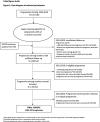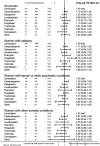First-trimester use of antiseizure medications and the risk of miscarriage: a population-based cohort study
- PMID: 38777577
- PMCID: PMC11287565
- DOI: 10.1136/jnnp-2023-333149
First-trimester use of antiseizure medications and the risk of miscarriage: a population-based cohort study
Abstract
Background: Antiseizure medications (ASMs) during the first trimester of pregnancy have been associated with an increased risk of miscarriage.
Methods: We carried out a population-based cohort study using routinely collected healthcare data from the UK, 1995-2018. Pregnancies were identified in the Clinical Practice Research Datalink and we estimated the HR of miscarriage associated with prescriptions of ASMs during the first trimester of pregnancy, using Cox regression, adjusting for potential confounders, including ASM indications.
Results: ASMs were prescribed during the first trimester in 7832 (0.8%) of 1 023 787 included pregnancies. 14.5% of pregnancies with first-trimester exposure to ASMs ended in miscarriage, while 12.2% without ASM exposure in the first trimester ended in miscarriage; after adjustment, there was a 1.06-fold relative hazard of miscarriage (95% CI 1.00 to 1.13) in women with first-trimester ASM use. After restricting to women with specific ASM indications, this association was not evident in women with epilepsy (adjusted HR 0.98, 95% CI 0.89 to 1.08), but was observed in women with bipolar or other psychiatric conditions (1.08, 95% CI 1.00 to 1.16) although CIs overlapped. Compared with discontinuation of ASMs prior to pregnancy, there was no evidence of increased risk of miscarriage for first-trimester ASM use in women with bipolar or other psychiatric conditions (1.02, 95% CI 0.87 to 1.20).
Conclusion: We found no clear evidence to suggest that first-trimester ASM use increased the risk of miscarriage. Taken together, our analyses suggest that apparent associations between first-trimester ASM use and miscarriage may be the result of confounding by the presence of a bipolar disorder or associated unmeasured variables.
Keywords: CLINICAL NEUROLOGY; OBSTETRICS; PSYCHIATRY.
© Author(s) (or their employer(s)) 2024. Re-use permitted under CC BY. Published by BMJ.
Conflict of interest statement
Competing interests: None declared.
Figures




References
MeSH terms
Substances
Grants and funding
LinkOut - more resources
Full Text Sources
Medical
